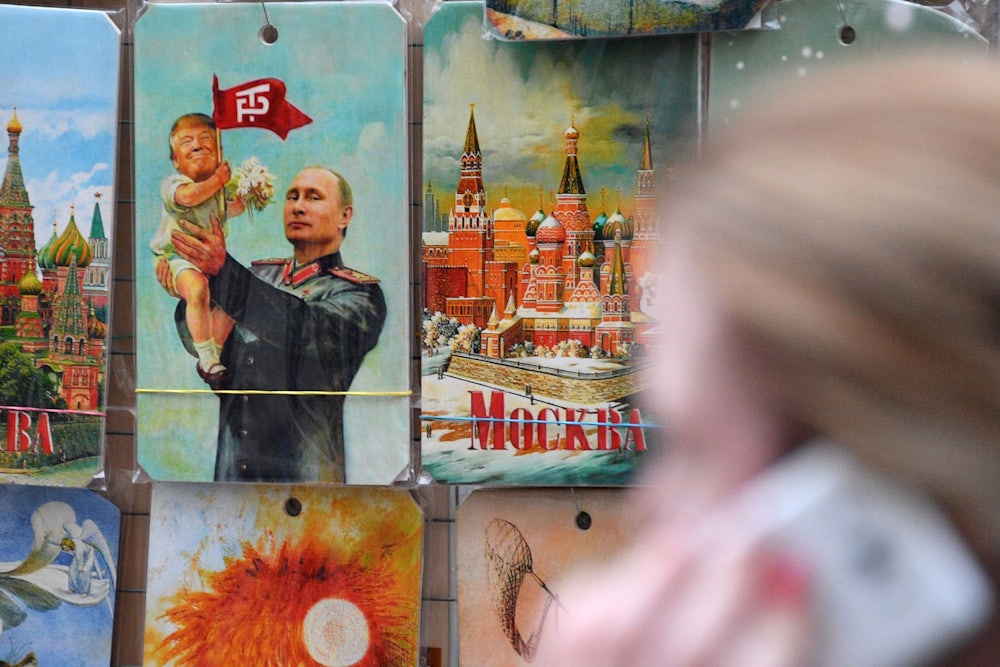In 2016, I was living in in Kyiv, Ukraine. The day after the U.S. election, I was on my way to the store when I overheard an old woman chatting on the phone about Trump’s victory. “The U.S. has sold us out to the highest bidder,” she sighed. President Trump, she assumed, would soon let Russia have its way in Eastern Europe.
The comment seemed overly dramatic; however imperfectly, the United States has played guarantor of the rules-based international order for decades, particularly committed to the core values of democracy. Yet as President Trump prepares to meet with Russian President Vladimir Putin in Helsinki on July 16, with both the international order and democratic values under attack, it seems the old Ukrainian woman’s worry was prescient.
Ukrainians followed the U.S. presidential campaign with concern; Trump’s rhetoric as a candidate seemed to threaten the critical Western support Kyiv had enjoyed after Russia illegally annexed the country’s Crimean peninsula and started a war in Ukraine’s eastern Donbas region. “The people of Crimea, from what I’ve heard, would rather be with Russia than where they were,” Trump told George Stephanopoulos in July 2016. In the same interview, Trump claimed Putin was “not going to go into Ukraine,” and that better relations with Russia would be a “good thing.” Ukrainians— and the nearly 10,000 mounting casualties in the then-two years of conflict—begged to differ.
There was an understandable nervousness in Kyiv as Trump was inaugurated. Outwardly, the unease shifted to spectacles of profuse public thanks and proclamations of victory every time the new administration took a demonstrably pro-Ukraine action, such as the decision to provide Kyiv with of anti-tank weaponry, which Ukraine had been lobbying for since the beginning of the conflict. But as the Trump-Putin summit approaches, scheduled unsettlingly close to the periodic NATO summit which has long held pride of place on the American security calendar, Ukrainians are feeling a familiar sense of foreboding. Trump’s recent comments, reiterated at the NATO summit on Thursday, suggest that caving to Russian ambitions in Ukraine—perhaps even formally accepting Russia’s illegal annexation of the country’s Crimean peninsula and aggression in the Donbas region—may be on the menu of concessions Trump is willing to make, along with potentially downsizing the U.S. troop presence in Europe, in exchange for Russia’s influence curtailing Iran’s presence in Syria.
On July 16, two elected officials will meet to discuss the issues of the day. Among them may be the future of the chatty Ukrainian grandmother with excellent foreign policy sense. One man knows nothing about the grandmother or her nation, the other has threatened its very existence. Conspicuously absent: any politician representing the grandmother herself. “Nothing about us without us,” an organizing principle of democracies for centuries, has particular historical resonance in these lands, having famously been enshrined in a forward-looking Polish constitution covering much of modern-day Ukraine in 1505. Now, it seems to be abandoned.
Trump’s noncommittal stance on the status of Crimea may stem from the desire to pursue better relations with Russia, but this is misguided. The United States has resolutely supported Ukraine for the past four years not because of anti-Russian sentiment, but because Russia violated the international order. It disregarded Ukraine’s right to sovereignty and self-determination, and has shown no sign of backing down, despite sanctions and increasing international isolation. But as we learned from his behavior at the G7 Summit, where he refused to sign a communique discussing the G7’s “commitment to promote a rules-based international order,” Trump may not see violations of international norms as a problem.
At every turn, Trump has questioned and denigrated the alliances and institutions that have kept America safe, prosperous, and free. Like Crimea, the U.S. commitment to NATO he rather publicly undercut at the most recent summit, or a strong stance on Russia’s election interference, the systems and values that govern American foreign and domestic policy seem to represent little more to Trump than pieces of real estate he can offer to leaders at a sort of foreign-policy auction. But the Russian president should have no purchasing power in this market. The Russian government’s continued denial of its involvement in wars in two countries—Ukraine and Syria—as well as its meddling in U.S. electoral processes and suspected nerve agent attack in the United Kingdom suggest that at this juncture, no Russian promise can be believed. Trump will seek one anyway, hoping to solve some of the most intractable conflicts with one of America’s least trustworthy adversaries in a flashy one-day event.
The best outcome from this meeting that will undermine liberal democracies and encourage strongmen the world over would be maintenance of the status quo and a public relations coup for Putin. The worst? As in Singapore, when negotiations with Kim Jong-Un led to Trump’s surprise announcement of the end of U.S. military exercises in South Korea, Trump could make concessions to Putin that might include anything from sanctions relief to the recognition of the Russian illegal annexation of Crimea. The man behind “The Art of the Deal” could trade away the rules-based international order, the future of a sovereign state and the democratic aspirations of millions of its citizens, and worst of all, the values on which our country was founded, all for a photo-op and the hazy promise of “getting along” with an authoritarian leader.
The Ukrainian woman on the phone that day worried about the U.S. selling Ukraine to the highest bidder. The United States’ president seems ready to sell that, and far more, for a bid that’s not even particularly high.
